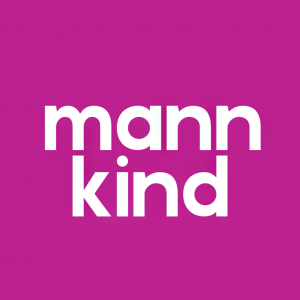INHALE-3 Study’s Initial Meal Challenge Results Comparing Afrezza® Head-To-Head With Multiple Daily Injections (MDI) and Insulin Pumps
- Post-meal hyperglycemia was significantly reduced by
20% with inhaled insulin compared with rapid-acting insulin delivered through MDI or insulin pumps - Subjects utilizing inhaled insulin experienced a
22% decrease in mean glucose excursions in the first two hours compared to the standard of care - 17-week primary endpoint results will be presented during a 90-minute symposium at the American Diabetes Association’s Scientific Sessions in June
DANBURY, Conn. and WESTLAKE VILLAGE, Calif., March 11, 2024 (GLOBE NEWSWIRE) -- MannKind Corporation (Nasdaq: MNKD), a company focused on the development and commercialization of inhaled therapeutic products and devices for patients with endocrine and orphan lung diseases, announced initial meal challenge data from INHALE-3 that was presented by Dr. Irl B. Hirsch at the 17th International Conference on Advanced Technologies and Treatments for Diabetes (ATTD) in Florence on March 8th. INHALE-3 is a Phase 4 U.S. clinical trial evaluating inhaled insulin (plus basal) vs. standard of care.
The statistically significant findings included:
- Subjects utilizing inhaled insulin experienced significantly reduced post-meal hyperglycemia, compared with those who used subcutaneous rapid-acting analogues (RAA) delivered by MDI or pumps
- Area under the curve (AUC; 180 mg/dL) was reduced by
20%
- Area under the curve (AUC; 180 mg/dL) was reduced by
- Inhaled insulin subjects demonstrated significantly lower glucose excursions from baseline
- Mean glucose excursions were reduced by
22%
- Mean glucose excursions were reduced by
- In the inhaled insulin group, mean glucose levels peaked 15 minutes sooner than in the standard of care group despite inhaled insulin being given at start of the meal vs. RAA being administered 5-15 minutes prior to the meal
“Clinician have been seeking options for people living with diabetes in hopes of identifying treatments that provide improved mealtime control,” said Dr. Hirsch, Professor of Medicine and Diabetes Treatment and Teaching Chair at the University of Washington and the INHALE-3 Study Protocol Chair. “It is exciting to share data from this study’s standardized meal challenge, demonstrating inhaled insulin can help address this unmet need.”
The 17-week endpoint results from INHALE-3 will be presented Saturday, June 22, during a symposium at the American Diabetes Association’s 84th Scientific Sessions in Orlando.
“One of the challenges of inhaled insulin adoption has been under-dosing when converting from injectable insulin, which causes patients to experience hyperglycemia,” said Dr. Kevin Kaiserman, Senior Vice President, Clinical Development and Medical Affairs for MannKind Corporation. “In this large, randomized trial utilizing more appropriate dose conversion, we are excited to see meal challenge results support the safety and efficacy of inhaled insulin from the start.”
INHALE-3 is a 17-week randomized controlled trial with a 13-week extension. The study, which enrolled 141 patients (123 randomized), assigned participants over 18 years of age with T1D who are using MDI, an automated insulin delivery system, or a pump without automation to either continue their standard of care or initiate an insulin regimen of a daily basal injection plus Afrezza for boluses (mealtime and corrections). Subjects utilizing inhaled insulin received a higher initial conversion dose than in the current label. Both arms utilized continuous glucose monitoring to assess glucose control. A1c levels were obtained at baseline, 17 and 30-weeks. For the meal challenge, the inhaled insulin group took an inhaled insulin dose immediately prior to a standardized meal (a 240 calorie nutritional shake) whereas those using usual care used RAA 5-15 minutes prior to the meal. More information on the INHALE-3 study is available at: ClinicalTrials.gov(NCT05904743).
About Afrezza
Afrezza (insulin human) Inhalation Powder is a rapid-acting inhaled human insulin indicated to improve glycemic control in adults with diabetes mellitus.
Limitations of Use: Not recommended for the treatment of diabetic ketoacidosis or in patients that smoke or have recently stopped smoking.
Important Safety Information
| WARNING: RISK OF ACUTE BRONCHOSPASM IN PATIENTS WITH CHRONIC LUNG DISEASE | |
| • | Acute bronchospasm has been observed in Afrezza-treated patients with asthma and COPD |
| • | Afrezza is contraindicated in patients with chronic lung disease such as asthma or COPD |
| • | Before initiating Afrezza, perform a detailed medical history, physical examination, and spirometry (FEV1) to identify potential lung disease in all patients. |
Most common adverse reactions are hypoglycemia, cough, and throat pain or irritation.
Please see additional Important Safety Information, Full Prescribing Information, including BOXED WARNING, available on Afrezza.com/safety.
About MannKind
MannKind Corporation (Nasdaq: MNKD) focuses on the development and commercialization of innovative therapeutic products and devices to address serious unmet medical needs for those living with endocrine and orphan lung diseases.
We are committed to using our formulation capabilities and device engineering prowess to lessen the burden of diseases such as diabetes, pulmonary arterial hypertension (PAH) and nontuberculous mycobacterial (NTM) lung disease. Our signature technologies – dry-powder formulations and inhalation devices – offer rapid and convenient delivery of medicines to the deep lung where they can exert an effect locally or enter the systemic circulation.
With a passionate team of Mannitarians collaborating nationwide, we are on a mission to give people control of their health and the freedom to live life.
Please visit mannkindcorp.com to learn more, and follow us on LinkedIn, Facebook, Twitter or Instagram.
Forward-Looking Statements
This press release contains forward-looking statements about the planned release of results from an ongoing clinical study that involves risks and uncertainties. Words such as “believes”, “anticipates”, “plans”, “expects”, “intends”, “will”, “goal”, “potential” and similar expressions are intended to identify forward-looking statements. These forward-looking statements are based upon MannKind’s current expectations. Actual results and the timing of events could differ materially from those anticipated in such forward-looking statements as a result of various risks and uncertainties, which include, without limitation, the risk that we may not achieve our projected development goals in the timeframes we expect, as well as other risks detailed in MannKind’s filings with the Securities and Exchange Commission, including its Annual Report on Form 10-K for the year ended December 31, 2023, and subsequent periodic reports on Form 10-Q and current reports on Form 8-K. You are cautioned not to place undue reliance on these forward-looking statements, which speak only as of the date of this press release. All forward-looking statements are qualified in their entirety by this cautionary statement, and MannKind undertakes no obligation to revise or update any forward-looking statements to reflect events or circumstances after the date of this press release.
AFREZZA and MANNKIND are registered trademarks of MannKind Corporation.








